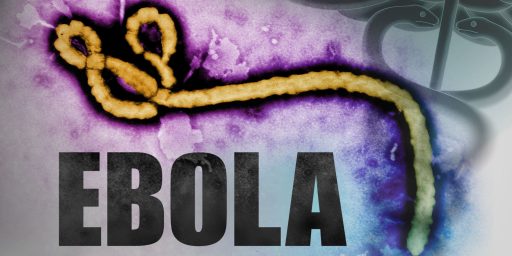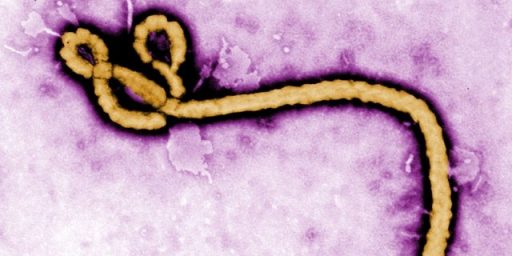Trials Of Ebola Vaccine Being Accelerated
The World Health Organization has announced that testing is set to begin soon on what could end up being a vaccine against the Ebola virus:
Health authorities and pharmaceutical companies are planning to test several new vaccines to prevent Ebola infection over the next few months, including one that is taken as a tablet, making it easier to deploy in West Africa.
The plans signify that a response to the Ebola outbreak is finally gathering steam. It is still unclear if any of these vaccines will work, however, and even if they do, they may not be ready in time to help stem the current epidemic.
Starting in January, two vaccines will be tested in large studies in the West African countries most affected by the outbreak, the World Health Organization said on Tuesday. At least three other vaccines will begin safety testing in healthy volunteers outside the outbreak zone in the first quarter of 2015.
One of those three is actually a combination of two inoculations being developed by Johnson & Johnson and Bavarian Nordic, a Danish company.
Johnson & Johnson announced early Wednesday that it was committing $200 million to the program, including making an equity investment of about $43 million in Bavarian Nordic to help pay for that company’s part in the project. It says it plans to begin safety trials in January and hopes to produce one million doses in 2015, with 250,000 available for broad application in clinical trials by May.
“Typically, you don’t make hundreds of thousands of vaccines before you know what the safety and immunogenicity is,” said Dr. Paul Stoffels, chief scientific officer of Johnson & Johnson. “This time, we will do that.”
The two most advanced vaccines in terms of development is each undergoing testing in about 250 healthy adult volunteers in the United States and other countries outside the outbreak region.
One of the vaccines was developed by the National Institutes of Health andGlaxoSmithKline. The other was initially developed by the Public Health Agency of Canada and licensed to NewLink Genetics, a company in Iowa.
The studies, known as Phase 1 clinical trials, are determining if the vaccines are safe and generate an immune response. Preliminary results are expected by the end of the year, Marie-Paule Kieny, the World Health Organization’s assistant director general for health systems and innovation, said in a news conference in Geneva on Tuesday.
But she said her organization was not waiting for those results. It is already planning the next stage of testing, to be ready to start in January if the vaccines pass the initial tests. Those new trials will take place in the affected countries in West Africa and would involve tens of thousands of doses, she said.
If this pans out, it could go a very long way toward halting the spread of Ebola in west Africa in the current outbreak and, more broadly, creating a herd immunity in the areas where the disease originates that would prevent it from entering the general population in the future. Undoubtedly, this would require some education of people in nations like Liberia and Sierra Leone about the importance of getting vaccinated against the disease, and we’d need to know if the vaccine is one that creates a permanent immunity or one that requires “booster” shots like some vaccines for childhood illnesses do. In any case, though, even just the news of these trials proceeding forward is tremendously good news. Hopefully, it will pan out.



No surprise at all.
Why?
Looks like a white person finally got infected.
We can’t have THAT, can we now.
I do wonder if we would start rolling out a vaccine that hasn’t even cleared the Phase I safety trials for an epidemic in the US.
Not saying it is a bad idea, or a good idea, but it really makes me wonder about the protocols for the studies, and whether there is a greater willingness to experiment on large groups of Africans because of legal issues or racial issues or distance issues (people far away are viewed more abstractly than people nearby), or whether this is a normal thing during an outbreak.
Does receiving a possibly not-very-effective vaccine make people more likely to be cavalier about safety precautions? If so, this might make things worse, not better.
I basically trust the World Health Organization, though, so… Mostly I think there is a very interesting, and very technical, story here about epidemiology that would go over the heads of most lay people.
@No Surpise There:
not to mention all the cash these pharm companies will make off of a terrified populace.
@T:
not to mention all the cash these pharm companies will make off of
a terrified populaceterrified conservatives.FTFY
Nobody was stopping African pharma companies from developing a vaccine.